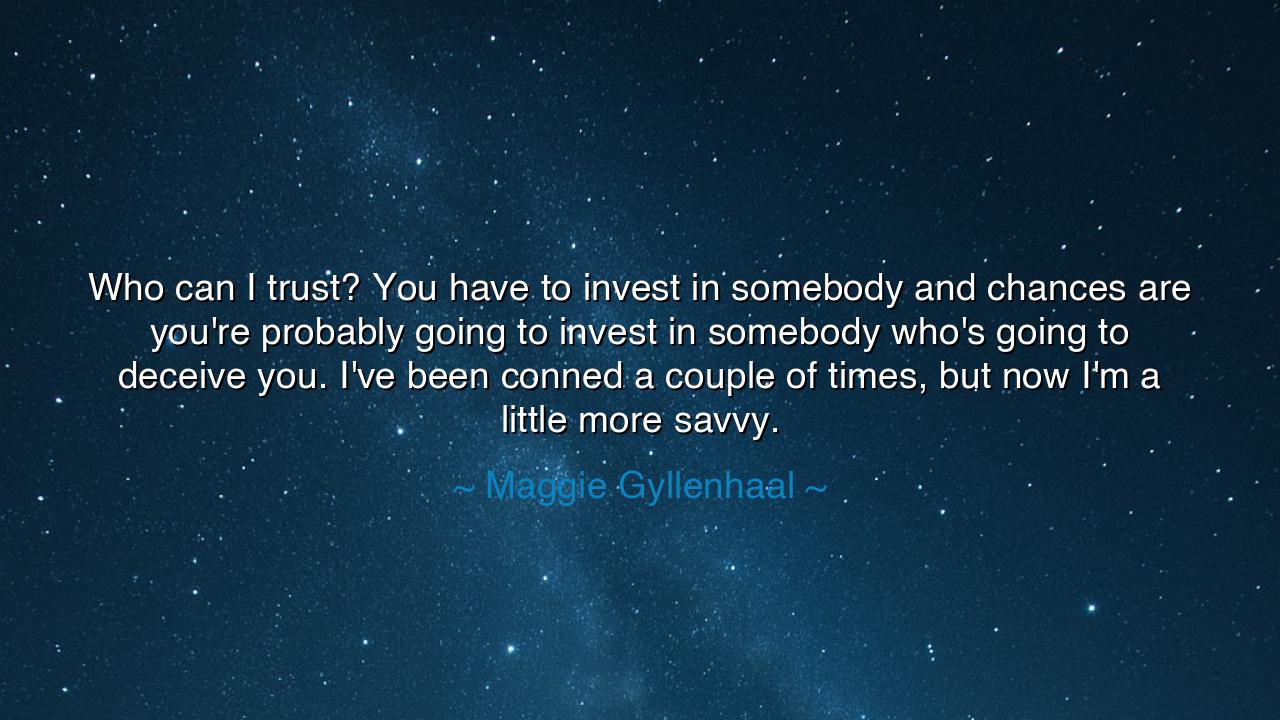
Who can I trust? You have to invest in somebody and chances are
Who can I trust? You have to invest in somebody and chances are you're probably going to invest in somebody who's going to deceive you. I've been conned a couple of times, but now I'm a little more savvy.






The words of Maggie Gyllenhaal—“Who can I trust? You have to invest in somebody and chances are you’re probably going to invest in somebody who’s going to deceive you. I’ve been conned a couple of times, but now I’m a little more savvy”—speak to one of the oldest and most painful struggles of the human condition: the fragility of trust. In her words we hear both lament and resolve. She acknowledges that to live in the world is to take risks, to place faith in others even knowing betrayal is possible. Yet she also proclaims that such experiences, though bitter, teach wisdom. It is the age-old cycle of innocence, betrayal, and growth.
The origin of this reflection lies in the realm of human relationships—whether in friendship, love, or professional dealings. Gyllenhaal, as an actress and public figure, has walked among many faces: some genuine, others false. Fame often attracts flatterers and opportunists, and thus her confession comes from experience. She admits that she has been conned, deceived by those she once trusted, yet she does not despair. Instead, she claims the greater prize: discernment, the ability to see more clearly, to weigh character more carefully, and to be “a little more savvy.” Her words remind us that betrayal, while painful, can refine the heart into greater strength.
History too illustrates this eternal truth. Consider the tale of the great explorer Hernán Cortés, who trusted some of his allies only to be deceived, and yet through those betrayals, learned the art of wariness that allowed him to survive. Or recall the story of Othello in Shakespeare’s tragedy, who invested his trust in Iago, only to find himself undone by deceit. Othello’s fate shows the danger of misplaced faith; Gyllenhaal’s words remind us that such wounds, while real, can be survived—and from them, wisdom grows.
The meaning of her words is that trust is both risk and necessity. We cannot live without it, for to live without trust is to isolate ourselves in suspicion and fear. Yet when we place our faith in others, we open ourselves to the possibility of betrayal. This tension cannot be avoided; it must be embraced with courage. Gyllenhaal acknowledges this hard truth: we will sometimes be deceived. But the wiser course is not to close our hearts, but to learn from the pain and become savvy, so that our future choices are more discerning.
There is also a heroic quality hidden in her confession. For to trust, even after betrayal, is an act of courage greater than battle. The soldier risks his life, but the one who trusts risks their soul. And yet, without such risk, no deep bond can ever be formed, no love can ever blossom, no society can ever endure. The history of nations and families alike is built upon trust—and when it is broken, civilizations falter. Gyllenhaal’s honesty reminds us that betrayal is common, but resilience is possible, and wisdom is born from wounds.
The lesson for us is this: do not fear betrayal so much that you cease to trust altogether. Accept that life requires the investment of faith in others, even knowing that some will prove false. But also, let betrayal sharpen your discernment rather than harden your heart. The wise learn to balance openness with caution, love with watchfulness, and faith with careful judgment. In this way, trust becomes not a blind gamble, but a sacred covenant offered wisely and guarded with care.
Practically, this means observing people not by their words alone, but by their actions over time. Test character in small things before entrusting great things. Forgive mistakes, but do not ignore patterns of deceit. When you are deceived, do not despair, but take the lesson as a gift of experience. And when you find those rare souls who prove steadfast, cherish them with all your strength, for they are treasures beyond price.
Thus, the wisdom of Maggie Gyllenhaal shines beyond her own experience: “Who can I trust? You have to invest in somebody… I’ve been conned… but now I’m a little more savvy.” Let these words be remembered as both warning and encouragement: that though betrayal is real, wisdom is possible; though deception wounds, it does not destroy; and though trust is risky, it is still the foundation of all that is noble and enduring in the human story.






AAdministratorAdministrator
Welcome, honored guests. Please leave a comment, we will respond soon